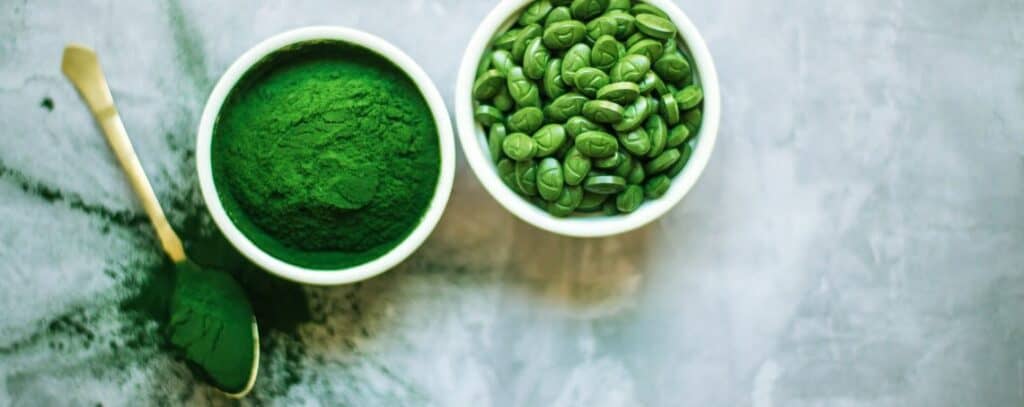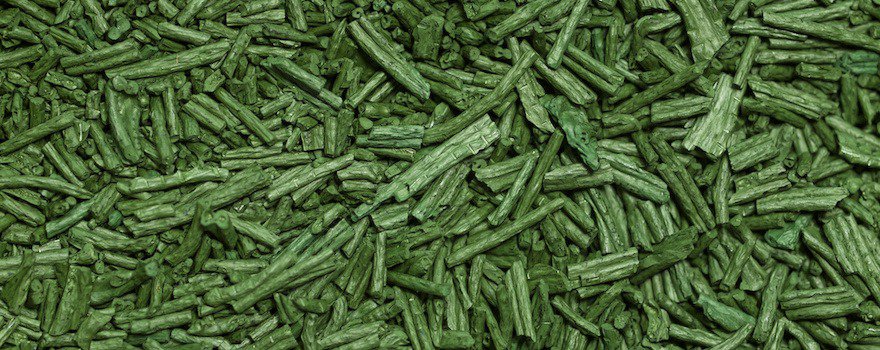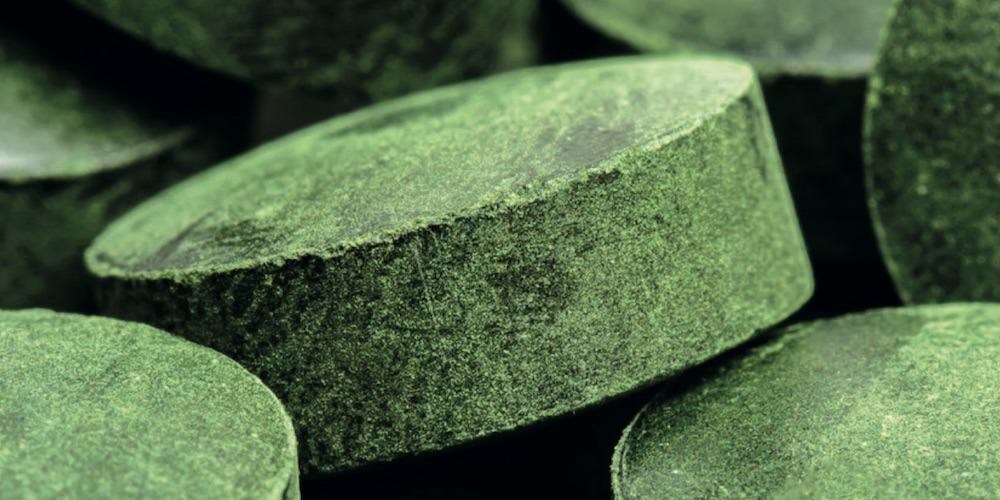What are the dangers of spirulina?
Warning from the magazine 60 Millions de Consommateurs about the origin of spirulina
The magazine 60 Millions de Consommateurs published in November 2019 a special issue dedicated to dietary supplements, warning about their lack of effectiveness and their side effects. A feature specifically cautions against the consumption of microalgae including spirulina.
Indeed, although many scientific studies have been conducted on both animals and humans, the magazine finds the clinical evidence for spirulina’s effectiveness promising but still insufficient clinical evidence for spirulina’s effectiveness.
But above all, it warns about its production methods and locations, which can be responsible for serious contamination. Because it absorbs the metals contained in the water and soil (if it comes from a lake) in which it grows, it can be toxic when its environment is polluted – heavy metals, hydrocarbons…
In 2008, for example, a study revealed the presence of lead and mercury in a Mexican spirulina. You should therefore be extremely vigilant about its origin, and, if possible, favor French farmed spirulina which is the most legally regulated.
Also read Where to buy quality spirulina?
Side effects and precautions
ANSES, the French National Agency for Food Safety, carried out between April 2014 and February 2017 a study entitled “Risks related to the consumption of dietary supplements containing spirulina”. It covers 49 reports of adverse effects possibly linked to the consumption of dietary supplements containing spirulina.
The study’s report, conducted as part of the national nutrivigilance system, identifies certain adverse effects such as digestive disorders, allergic reactions, and some muscle and liver damage.
It also appears that products containing spirulina can be contaminated by cyanotoxins, bacteria or trace metals such as lead, mercury or arsenic.
But apart from the risk of contamination inherent to its origin, spirulina is not dangerous at low doses.
To ensure the consumption of quality spirulina, ANSES also recommends favoring short, better-controlled supply chains.

Buying organic, traceable spirulina: my selection
To avoid taking any risks, I recommend the organic spirulina from the Nutri&Co laboratory. Its traceability is guaranteed down to the cultivation farm, and it is certified organic.
The bacteriological and heavy metals analyses are freely available on the laboratory’s website.
I recommend this spirulina in particular because the value for money is especially attractive (€0.04 per tablet, which is below the market average).
It is dried and cold-compressed and contains 17% phycocyanin, its active compound.
J’aime beaucoup Nutri&Co : c’est une marque française de compléments vraiment experte (voir leur blog notamment) qui supprime tous les intermédiaires pour proposer des produits de haute qualité à un prix raisonnable.
❤ I love : The excellent value for money, organic certification and low-temperature drying.
★ Customer reviews : 4.7/5
☞ Quantity : 500 tablets / 3-month supply
✔ Our test : Nutri&Co promo codes
Side effects and misconceptions
Contraindications
- Its stimulating effects can interfere with sleep in some people, so it is recommended not to consume it in the evening.
- People suffering from phenylketonuria should not consume spirulina, because it contains phenylalanine.
- There have been reports of gastrointestinal disorders in some users; if these symptoms persist it is advised to discontinue use and consult a doctor.
- It is not recommended for pregnant women or breastfeeding women, for people suffering from hemochromatosis and renal insufficiency.
Dangers of spirulina for the liver
The liver is a vital organ that functions as a filter within our body. During digestion, it captures and eliminates toxins present in our diet: preservatives, alcohol, pesticides… In short, it detoxifies our body.
When our liver is overworked, our metabolism slows down. Spirulina and its high iron content can speed up transit and cause bloating linked to excessive stimulation of the liver. Some side effects such as constipation can then occur.
In cases of hemochromatosis, a relatively rare disease characterized by an excess of iron and the liver’s inability to eliminate it, spirulina is not recommended. This is because if the blood is too high in iron, it can lead to liver, pancreatic, or joint problems.
Therefore, individuals with digestive or liver problems are also advised not to consume excessively high doses of spirulina.
One of the dangers of spirulina is also related to its high protein content. Indeed, an excess of protein can place too much strain on the kidneys and affect people with kidney failure.
Should be avoided in cases of phenylketonuria
Spirulina is strongly not recommended for people with phenylketonuria, a rare genetic disorder. Because it contains phenylalanine, an amino acid not metabolized by individuals with phenylketonuria, it may contribute to the accumulation of phenylalanine in the nervous system.
Spirulina and pregnant women
Some articles portray spirulina as dangerous for pregnant women. Although there is no proven danger in this specific case, it is always advised to seek medical advice.
Spirulina is a particularly suitable food during pregnancy and breastfeeding. Its nutrients support the body, which is more taxed than usual during pregnancy, and help prevent deficiencies.
This includes the iron needs during pregnancy, especially in the last six months, which can be met by consuming it.

Spirulina and the thyroid
The thyroid is a gland located in the neck. It secretes hormones that regulate the body’s proper functioning: temperature, weight, heart rate, nervousness… It is called hyperthyroidism when it produces too many hormones and, conversely, hypothyroidism when hormone production is insufficient.
Contrary to some misconceptions, spirulina does not cause thyroid dysfunction and is therefore safe, as it is a cyanobacterium that grows in alkaline or fresh water lakes, not a marine alga. It therefore does not contain iodine, a chemical element that in excess can cause hyperthyroidism.
Since it strengthens the physical weaknesses caused by thyroid problems and stimulates the immune system, it is actually quite recommended in this situation.
Known for its detoxifying and revitalizing benefits, it also regulates metabolism, protects the gut flora or even reduces mood disturbances that some individuals with thyroid problems experience daily.
How to consume it properly to limit the risks of spirulina
Follow the dosage
⚖️ It is recommended to consume 2 to 5g per day of spirulina, increasing the doses gradually. But exceptionally, athletes can take up to 10g per day during intense physical training.
⏳ It is best consumed in the morning and at midday, just before or during meals. Three-month courses are recommended to better appreciate the benefits.
💊 In tablet form: if the tablets or capsules weigh 500 mg, up to 10 per day
🥄 In powder form: 2 teaspoons or 1 tablespoon per day
🥗 In flakes: 1 teaspoon per day
Spirulina, vegan diet and vitamin B12
Warning: spirulina is not a superfood capable of meeting all of the body’s needs in a vegan diet.
Indeed, when following a vegan diet, you do not get vitamin B12 from animal-derived foods. Even though spirulina contains a form of vitamin B12, it is not bioavailable and is even suspected of preventing the absorption of true vitamin B12.
Therefore, in this case, it is necessary to have a specialized dietary supplement prescribed by a doctor.
Consume a quality product with a controlled origin
With all these warnings about its origin and production methods, we’d like to favor organic spirulina. But this one doesn’t yet exist! In France, spirulina cultivation does not meet the criteria for organic agriculture, because it depends on the specifications for marine algae — even though it is a cyanobacterium that grows in freshwater.
Through an equivalence system, organic spirulina is available from other countries, but we’ve seen that its production conditions are much less strict and lower in quality than in mainland France.
We should therefore prioritize the supply chains that are most closely monitored by public authorities. This helps ensure compliance with French regulations, product traceability, and clear identification of the manufacturer.
Control of the quality of the production waters for this cyanobacterium and control of the manufacturer’s spirulina production processes are also signs of quality.




